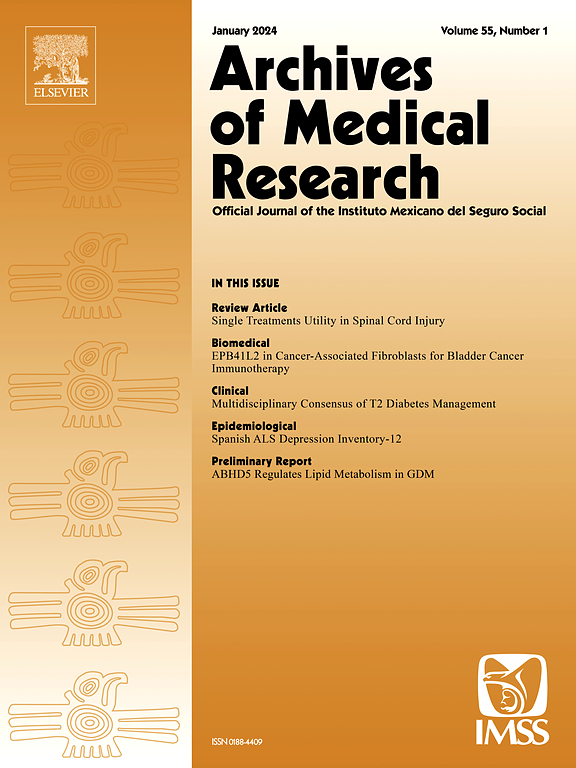糖尿病损害间充质间质细胞治疗的骨再生能力
IF 3.4
3区 医学
Q1 MEDICINE, RESEARCH & EXPERIMENTAL
引用次数: 0
摘要
糖尿病(DM)对骨组织产生负面影响,导致骨质流失和骨折风险增加。许多个体需要额外的治疗,基于间充质间质细胞(MSCs)的治疗是治疗糖尿病患者骨缺损的一种很有希望的治疗方法。目的本研究探讨了来自正常血糖(NG-MSCs)和糖尿病(DM-MSCs)供体的间充质干细胞相互作用对成骨细胞分化的影响,以及使用NG-MSCs进行细胞治疗对糖尿病大鼠骨缺损再生的影响。方法采用链脲佐菌素诱导DM后,观察大鼠股骨形态计量学参数和MSCs的成骨分化情况,以及NG-MSCs和DM-MSCs相互作用对其成骨分化的影响。通过观察局部注射NG-MSCs或载体对糖尿病大鼠颅骨缺损的骨修复效果,观察细胞治疗的效果。结果dm诱导骨丢失,MSCs成骨分化受损,NG-MSCs能部分恢复成骨分化,而NG-MSCs处理的缺损骨形成与对照相似。这些结果表明,NG-MSCs对DM-MSCs的有益作用并没有转化为增强骨修复,这主要是由于高血糖造成的不利环境损害了MSCs诱导骨形成的能力。本文章由计算机程序翻译,如有差异,请以英文原文为准。
Diabetes Mellitus Impairs the Bone Regeneration Capacity of Mesenchymal Stromal Cell-Based Therapy
Background
Diabetes mellitus (DM) negatively impacts bone tissue, leading to bone loss and increased fracture risk. Many individuals need additional treatments, and therapy based on mesenchymal stromal cells (MSCs) represents a promising treatment for bone defects in patients with diabetes.
Aims
The present study explored the effects of interactions between MSCs from normoglycemic (NG-MSCs) and diabetic (DM-MSCs) donors on osteoblast differentiation and the effects of cell therapy using NG-MSCs on bone regeneration in defects created in diabetic rats.
Methods
After inducing DM with streptozotocin, we evaluated the morphometric parameters of rat femurs and the osteoblast differentiation of MSCs, as well as the effects of the interaction between NG-MSCs and DM-MSCs on their osteoblast differentiation. The efficacy of cell therapy was measured by evaluating the bone repair in calvarial defects of diabetic rats treated with local injections of either NG-MSCs or a vehicle.
Results
DM induced bone loss and impaired the osteoblast differentiation of MSCs, which was partially restored by NG-MSCs, while the bone formation observed in defects treated with NG-MSCs and the vehicle was similar.
Conclusion
These results indicate that the beneficial effect of NG-MSCs on DM-MSCs did not translate into enhanced bone repair, mainly due to a hostile environment created by hyperglycemia, which compromised the ability of MSCs to induce bone formation.
求助全文
通过发布文献求助,成功后即可免费获取论文全文。
去求助
来源期刊

Archives of Medical Research
医学-医学:研究与实验
CiteScore
12.50
自引率
0.00%
发文量
84
审稿时长
28 days
期刊介绍:
Archives of Medical Research serves as a platform for publishing original peer-reviewed medical research, aiming to bridge gaps created by medical specialization. The journal covers three main categories - biomedical, clinical, and epidemiological contributions, along with review articles and preliminary communications. With an international scope, it presents the study of diseases from diverse perspectives, offering the medical community original investigations ranging from molecular biology to clinical epidemiology in a single publication.
 求助内容:
求助内容: 应助结果提醒方式:
应助结果提醒方式:


